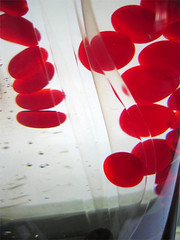 Is your teen a little down, or is she experiencing a major depression? Maybe it isn’t depression at all, but rather, a form of anxiety. These types of disorders can sometimes be difficult for doctors and psychologists to diagnose. Scientists have developed a blood test that can make it easier to diagnose depression in teens.
Is your teen a little down, or is she experiencing a major depression? Maybe it isn’t depression at all, but rather, a form of anxiety. These types of disorders can sometimes be difficult for doctors and psychologists to diagnose. Scientists have developed a blood test that can make it easier to diagnose depression in teens.
Depression is not limited to adults. Major depression affects about 1% of children who are under the age of 12. By the time a young person reaches his or her late teens or young adulthood, that percentage goes up to around 25%. Teens, and young adults, who are experiencing major depression, and who do not receive treatment, are at an increased risk for physical illness, substance abuse, and suicide.
One of the difficulties that doctors face when trying to diagnose depression in a teenager has to do with the diagnostic process. It involved a doctor, or therapist, asking the teenager a series of questions in order to determine how many symptoms of depression the teen is currently experiencing, (and for how long each symptom has been happening).
Parents know that it can be very difficult to get an unwilling teenager to talk about something that they are not willing, or that they are unable, to share. When a doctor starts asking a teenager if he is feeling sad, or if her school work and grades have dropped, the depressed teen may decide that he or she just doesn’t want to talk about it. He or she may report feeling fine, and doing fine, when that isn’t really how things are going.
Scientists have developed a blood test that can help doctors to make a diagnosis. The blood test can provide some concrete evidence that can be used to determine if the teen is depressed, is in a major depression, or is experiencing something else (like anxiety).
This test is not yet ready to be used, because larger studies need to be done. The team of scientists looked at 26 blood biomarkers for depression and anxiety. Next, they tested these indicators in 14 teens who had major depression, but who had not been treated for it. They also tested the same indicators in 14 teens who were not depressed.
It turned out that 11 of the indicators were linked to depression. 18 of indicators were linked to both anxiety and depression. Again, more studies need to be done before this new tool in diagnosing major depression in teens can be used by doctors.
Image by Rob Pongsajapan on Flickr

